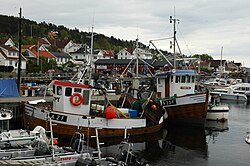Drøbak, Norway
| Drøbak | |
|---|---|
| Unincorporated city | |

Drøbak from harbor area
|
|
| Location within Norway | |
| Coordinates: 59°40′N 10°38′E / 59.667°N 10.633°E | |
| Country | Norway |
| County | Akershus |
| District | Follo |
| Municipality | Frogn |
| City status (regained) | 13 February 2006 |
| Government | |
| Population (2006) | |
| • Total | 11,514 |
| • Density | 1,688/km2 (4,370/sq mi) |
| Time zone | CET (UTC+1) |
| • Summer (DST) | CEST (UTC+2) |
Drøbak is a town and the centre of the municipality of Frogn, in Akershus county, Norway. The city is located along the Oslofjord, and has 13,358 inhabitants.
Drøbak and Frogn was established as a parish on its own through a royal decree Sept. 8, 1823. It had been a part of Ås parish.
Drøbak was established as a municipality January 1, 1838 (see formannskapsdistrikt). It was merged with Frogn January 1, 1962.
Traditionally, Drøbak was the winter harbour of Norway's capital, Oslo, since in severe winters the fjord will freeze from outside Drøbak all the way up to Oslo. It had a city status between 1842 and 1962, upon which point the municipality was merged into the rural municipality Frogn and lost its city status. The city status was regained by the municipality council on 13 February 2006. It was also decided that adjacent villages such as Heer would be included within the city.
A notable event in Drøbak's history is the World War II sinking of the German cruiser Blücher in the Drøbak narrows (only 1 mile (1.5 km) wide), on the early morning of 9 April 1940. The cruiser was transporting German soldiers and bureaucrats for the planned swift occupation of Oslo, but the Battle of Drøbak Sound resulting in the sinking by the Oscarsborg fortress delayed this, and thus allowed for the evacuation of the Norwegian Royal Family, parliament, and cabinet, and for the nation's gold reserves to be denied the occupiers.
Early Drøbak had ferries that crossed the fjord, in modern times they have largely been replaced by an underwater tunnel. However, some of the old ferries are still used as "floating restaurants" during the summer.
In summertime, cruise ships visit Oslo almost every day. Often, as many as four or five cruise ships visit each day, in addition to all the regular traffic, it has made Drøbak a popular sea-side tourist spot. However, the numerous restaurants, art galleries and mild summers are probably more important factors for visiting tourists.
...
Wikipedia

